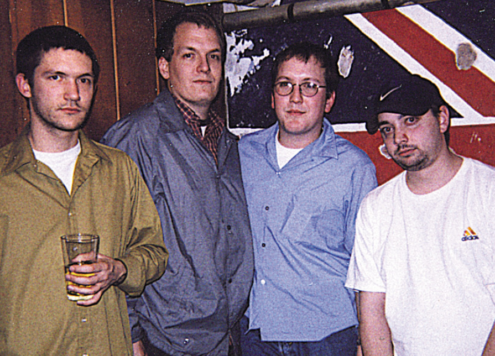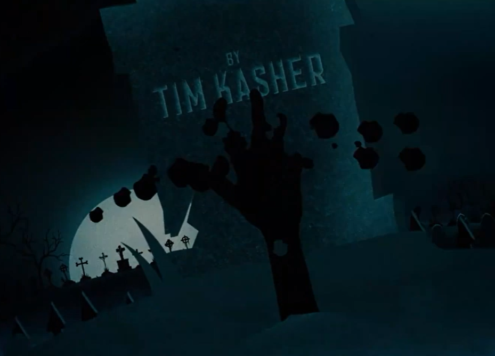Within the band’s 7-year existence, it was able to spit out 3 studio albums, an EP, and some split releases before it initially imploded. What’s old sometimes becomes new and for the post-hardcore outfit, These Arms Are Snakes, Duct Tape & Shivering Crows (Suicide Squeeze) compiles its b-sides and split releases into this one release. It needs to be said: this band offered music that scorched the earth with aggressive rhythms and frenetic guitar antics. The band even gives Nirvana’s “Heart Shaped Box” a different look here. It compiles 13-songs that provide a definitive look, painting clear images of the band’s identity. The release was enough to give the group a kick in the crotch to reassemble and perform live on select dates. Will there be a new release in the making? We’ll see how it goes but until then, enjoy the double LP.
Throughout the years, no one can say Cursive, that emotionally charged group out of Omaha, Nebraska, has ever just sat on its laurels waiting for a handout. Since 1997, the band has released 11 tightly wound albums, full of melancholic angst, fiery vitriol, and heartfelt lyricism sometimes wrapped around cacophony but always delivering sonically challenging music. Vocalist Tim Kasher has always kept busy, either playing on releases by other artists or recording concurrently with his other outfit, The Good Life. But it’s his own solo releases that probably don’t garner him the rightly deserved attention.
Kasher has just released his third proper full-length album, Middling Age (15 Passenger), and here, we find him dealing with every day situations as he’s done in the past. There’s no slowing down though, we still find Kasher’s obsessing over things as well. Within the stormy delicacy of his guitar notes on “I Don’t Think About You,” with lyricism is filled with memories while also adding “I don’t think about you all the time” which he obviously is. Post-love hardens the heart but not here as that cache or recollections haunts his memory. But “What Are We Doing” quickly shifts the momentum as Kasher questions revolve around our existential being. When he sings “Jumped in a taxi/a man from Afghanistan/drives for his family/ sending home every paycheck/he lives with 10 men/taking shifts sharing one bed,” he’s pulling from real-life situations to get his point across when he questions “What are we doing?” He sings over a bouncy bed of guitar-bass-drums accentuated by strings and wind instruments. It’s clever all around. But throughout the album, there are a number of subjects Kasher tackles.
Kasher deals with some of the ominous ghosts of his past in “The John Jouberts,” which rallies around his own “boogieman” who went on a murderous spree killing kids in his hometown. He finds a bit of closure here, mentioning victims by name, paying homage in remembrance. Kasher’s wording is playful though knowing it’s no laughing matter finding the irony in statements like “They say the good die young” but understanding “What shitty thing to say!” There’s irony in his words and he’s well aware of it. But it’s the awkward and teetering “On My Knees” that listeners may find solace within. With bent guitar notes, piano, and chattering rhythms and his words wrapped around self-reliance, shunning Catholicism and the “crucifix as a crutch.” It’s impactful, and it’s cause and effect in the most clarifying way.
One thing about Kasher is his ability to force listeners to pay attention whether they want to or not. The sweet & somber “You Don’t Gotta Beat Yourself Up About It” challenges existence while the punchy “Life Coach” will have just about anyone questioning their own choices, filled with a wall of horns and a variety of instruments. But it’s the heart-wrenching “Whisper Your Death Wish” that’s clear in its finality. It’s beautiful, it’s perfect, and comes to an end.
Tim Kasher allows us to take this journey with him as time continues to move forward, and Middling Age is probably one of the more realized works to date he’s offered.
Facebook | Twitter | Instagram
The past decade has seen a slew of releases by Eugenius, the Cincinnati, Ohio bred emcee that has been offering a unique sound and style. The rapper’s latest effort, Crisis (Friend Club Records), takes a much more varying Avant-Garde approach, pushing the proverbial envelope, to release 18 tracks album that is derivative unto itself. While Eugenius never relinquishes the thought or idea that he is in fact an emcee, there’s much more to Eugenius that involves a kaleidoscope of artistry.
With “The Turning Of Tides,” the opening track, his barely audible vocals may be muddled within the mix of percussion, thick bass lines & strings, its presence is of importance when he shifts gears and begins to sing. The song transforms into a heavy-hitting beast of a track with massive & murky drums becoming the focal point. On the darkly tinged “Swivel,” Eugenius shares barbs with sb the moor, and the song’s unique and thunderous bottom end is difficult to ignore. It’s wild but with direction, it’s bestial but refined. It’s two things that shouldn’t be able to exist with one another but does. The juxtaposition isn’t missed here. There’s more than one side of Eugenius as an artist as “Moment In Time” can attest to. We do find him, mixing in rhymes throughout but it’s the sorrowful delivery, yearning, craving for something just out of reach. He sings with such conviction. This(!) is beyond words. Shadowy hues of clouds linger around “Over” which features Happy Tooth. Their deliveries are disturbing, the song seems disturbing and it’s disturbingly perfect in its gloominess.
“The Muse” offers up much of his dexterous ability to place his rhymes and phrases in just about any way he can imagine on this orchestrated melancholia backdrop filled with piano, strings, haunting background vocals, and mechanized beat. It’s the same with “By the Teeth (feat. Becky Fontaine and Nathan Gray) where he and Fontaine are seamless when singing together, hitting delicate harmonies and melodies. They’re accompanied by strings and what sounds like a fragile strummed ukulele. The song is captivating. But it’s the differences throughout the album that allows it to walk a tightrope of divergence and “Tow The Line” definitely hits differently. It’s mechanical aggression on overdrive directed by ggrrxrrg that’s suggestive of deviation into a much more electronic/boom-bap industrialized concoction. As odd as that might seem, it works to the benefit of the song itself. Eugenius closes out with “Survive” where again, Eugenius alters the reality of Hip-Hop, candidly traversing through sound (horns, strings, piano) where he both sings and raps. Clocking in at over six minutes, he’s able to entertain his own multifaceted talents, engaging anyone willing to listen.
Ponder for a moment an artist that’s willing to risk it all, with a clear ability to showcase more than one aspect of his own creativity. Crisis is filled with an entire range of emotions, captivating the senses and tugging at heartstrings. It’s an album that’s challenging through its massive exploratory sounds. This should be the album that raises him from obscurity to national notoriety. I don’t know, Eugenius or just genius? I’d say it’s the latter. Tenfold.












Social Media